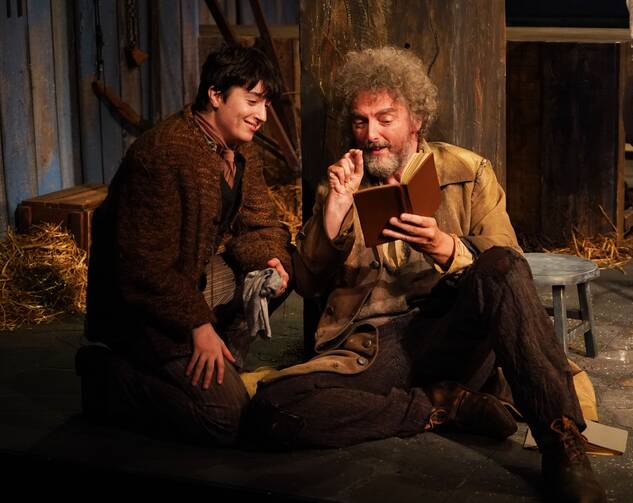In the first chapter of the Book of Genesis, God gives names. “God called the light ‘day,’ and the darkness he called ‘night’…God called the dome ‘sky’…God called the dry land ‘earth,’ and the basin of water he called ‘sea.’” Then, God entrusts to Adam the important duty of naming all animals.
Naming still carries sacramental importance today. Christian names are reaffirmed at baptism, and before Confirmation young Catholics adopt the name of a saint they revere.
Pope Francis has noted the importance of naming within the sacraments; when a parent is asked to announce the name of their child during the welcoming rite of Baptism, “the name indicates a person’s identity,” Pope Francis has said. “To emerge from anonymity we immediately say our name. Without a name one remains an outsider, without rights and duties.”
This sacred act of naming is explored within the context of colonialism in Brian Friel’s widely celebrated play “Translations,” part of a trio of Friel’s plays scheduled for the Irish Repertory Theater in New York City in celebration of his life and works. “Translations,” first published in 1980, ran at the Irish Rep from Oct. 29 to Dec. 31.
The play revolves around a group of Irish men and women spanning several generations who are enrolled in a secretive hedge school. These schools, widespread in rural Ireland at the time, provided an informal (and, for many years, illegal) primary education to many Irish schoolchildren. Because they often included instruction in the Irish language as well as Catholic religious education, they were a symbol of Catholic resistance to British rule.
In “Translations,” the education and lives of the school’s pupils are interrupted by the arrival of British soldiers in their town. They have come to reconstruct the map of Ireland, to anglicize the names of its towns and cities.
Friel has insisted the play is about “language and only language,” and the way words are used has massive implications on cartography, geography, love, familial relationships and more. His emphasis on the perceived importance—or lack thereof—of the names of people, places and things is paramount, especially in a nation where Catholicism is the dominant religion.
In the opening scene, Sarah (played by Erin Wilhelmi), a woman with a disability, is taught by the patient schoolmaster’s son Manus (played by Owen Campbell) to say her name aloud for what is seemingly the first time. But Sarah is not a toddler; the viewer can assume she’s likely in her early 20s.
His emphasis on the perceived importance—or lack thereof—of the names of people, places and things is paramount, especially in a nation where Catholicism is the dominant religion.
“My name…is Sarah,” she finally says after a few belabored but brave attempts, all the while encouraged by Manus. Joy spreads across her face, as she begins to hear herself articulate her name with her voice for the first time.
After teaching her to say her name, Manus points to a vase of flowers that Sarah had picked. Sarah may know exactly what is in the vase but has probably never before verbalized the word “F…flowers,” she says.
In the play, Manus openly resents the British colonizers and criticizes his brother Owen (Seth Numrich) for not confronting the British Lieutenant, Yolland (Raffi Barsoumian) repeatedly calling him Roland by mistake. “Where did Roland come from?” Manus asks his brother. “I don’t know,” Owen sheepishly replies. It may not make a difference to Owen, but Manus sees the perversion of his brother’s name as a further sign of linguistic colonialism. Owen, who offered his services as a translator to the British and is recruited to assist in anglicizing Irish town names—as he speaks both English and Irish—views it as no big deal; but Manus disagrees.
The anglicized “Roland,” with its Germanic roots, is a far cry from his brother’s true Irish name. For Manus, what’s in a name means everything, including pushing back against the disintegration of Irish tradition.
But Owen isn’t just a blind colonial loyalist. At a memorable moment in the play, Owen explains to Yolland that Tobair Vree, a nearby town, is named after a well that was believed to contain water with miraculous healing powers. As local legend goes, there was a man who had a massive growth on his face who washed himself in the well every day for months to heal the growth; one day, he drowned in it.
But, as Owen comes to reveal, the well for which the town is named is no longer in the town; it’s over 100 yards away. “The well was blessed and he drowned in it…do we really keep piety with a man long dead?” Owen asks Lieutenant Yolland while they struggle to rename the town to something that fits better with modern English.
The British Captain Lancey (Rufus Collins) pedantically looks down on the raggedy Irish in his luxurious redcoat from the beginning of the play. He is the epitome of someone who uses language and naming as a way to “correct” practices he deems foreign to his own, and therefore improper. All the while Lieutenant Yolland finds himself struggling between his duties to Britain and his newfound love for the Irish landscape and language.
Gradually Yolland falls in love with more than the words and countryside of Ireland. He and Maire (Mary Wiseman), a milkmaid enrolled in the hedge school, begin to fall for each other despite their linguistic differences. Save for the few Irish words Yolland knows and the odd English phrases Maire can recite, all they know how to say are each other’s names. But that is good enough for the romantic pair. “Don’t stop [talking]—I know what you’re saying… I want you, too, soldier,” Maire tells Yolland during a tender moment between the two of them. Language may serve as a barrier between Yolland and Maire, but in their relationship, Friel illustrates the transcendent power love has to overcome even the largest roadblocks in communication.
For Manus, what’s in a name means everything, including pushing back against the disintegration of Irish tradition.
Following Yolland’s disappearance (it is suspected that he is murdered by Irish twins disgruntled with the British forces), the second act of the play takes a dark turn as the British forces threaten to kill livestock and burn crops to the ground if information about Yolland’s disappearance is not produced. As he is translating Lancey’s orders to the hedge schoolers, the look on Owen’s face descends into horror as he begins to realize the true nature of the men he has been helping all along. While Owen may not have cared much about Yolland getting his name right, it finally dawns on him that the military operation to rename Ireland is less about the anglicization of names than it is about the near eradication of the Irish way of life.
“Translations” ponders how language influences our identity, the past and the present, and the relationship between the colonizer and the colonized. Most importantly, Friel reminds us that really, all we have is our names; while important to question the origins behind them, without them, we are simply not ourselves.








